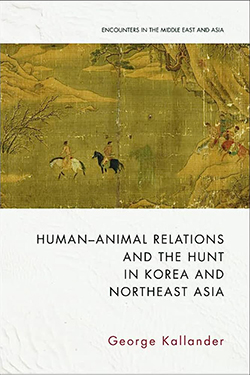Human-Animal Relations and the Hunt in Korea and Northeast Asia
George Kallander
Edinburgh University Press, May 2023

George Kallander, professor and director of graduate studies for the history department, has written his third book, “Human-Animal Relations and the Hunt in Korea and Northeast Asia” (Edinburgh University Press, 2023).
In the book, Kallander analyzes the significance of wild and domestic animals to Korea and Northeast Asia from the 1270s until 1506. He situates the Korean peninsula in relation to the neighboring Mongol Empire and Ming Dynasty China. During this period, Korean statesmen and rulers expanded their influence over people and the environment; human-animal relations became increasingly significant to politics, national security and elite identities. His numerous research materials include a fifteenth-century manuscript on falconry.
“Human-Animal Relations” studies the significance of the natural world in Korean and Northeast Asian cultural, political, economic and regional relations, as animals were hunted, bartered in trade, offered as gifts and sacrificed ritually. They played an important role in shifting power dynamics and royal authority.
Kallander has previously written two books about the history of premodern and early modern Korea: “The Diary of 1636: The Second Manchu Invasion of Korea” (Columbia University Press, 2020) and “Salvation through Dissent: Tonghak Heterodoxy and Early Modern Korea” (University of Hawai’i Press, 2013). At Maxwell, he directs the Moynihan Institute’s East Asia Program and teaches courses on Korea, Japan, the Korean War, East Asia and global history. He received a Ph.D. from Columbia University.
From the Publisher:
This book focuses on the transitional period in late Koryŏ and early Chosŏn dynasty Korea from the 1270s until 1506, situating the Korean peninsula in relations to the neighbouring Mongol Empire and Ming Dynasty China. During this period, Korean statesmen expanded their influence over people and the environment. Human-animal relations became increasingly significant to politics, national security, and elite identities.
Animals, both wild and domestic, were used in ritual sacrifices, submitted as tax tribute, exchanged in regional trade, and most significantly, hunted. Royal proponents of the hunt, as a facet of political and military legitimacy, were contested by a small but vocal group of officials. These vocal elites attempted to circumscribe royal authority by co-opting hunting through Confucian laws and rites, either by regulating the practice to a state ritual at best, or, at worst, considering it a barbaric exercise not befitting of the royal family.
While kings defied the narrow Confucian views on governance that elevated book learning over martial skills, these tensions revealed how the meaning of political power and authority were shaped. Attention to animals and hunting depicts how a multiplicity of cultural references—Sinic, Korean, Northeast Asian, and steppeland—existed in tension with each other and served as a battleground for defining politics, society, and ritual. Kallander argues that rather than mere resources, animals were a site over which power struggles were waged.
Published in the Fall 2023 issue of the Maxwell Perspective
Related News
Research

Apr 17, 2025
Commentary

Apr 14, 2025
School News

Apr 9, 2025
